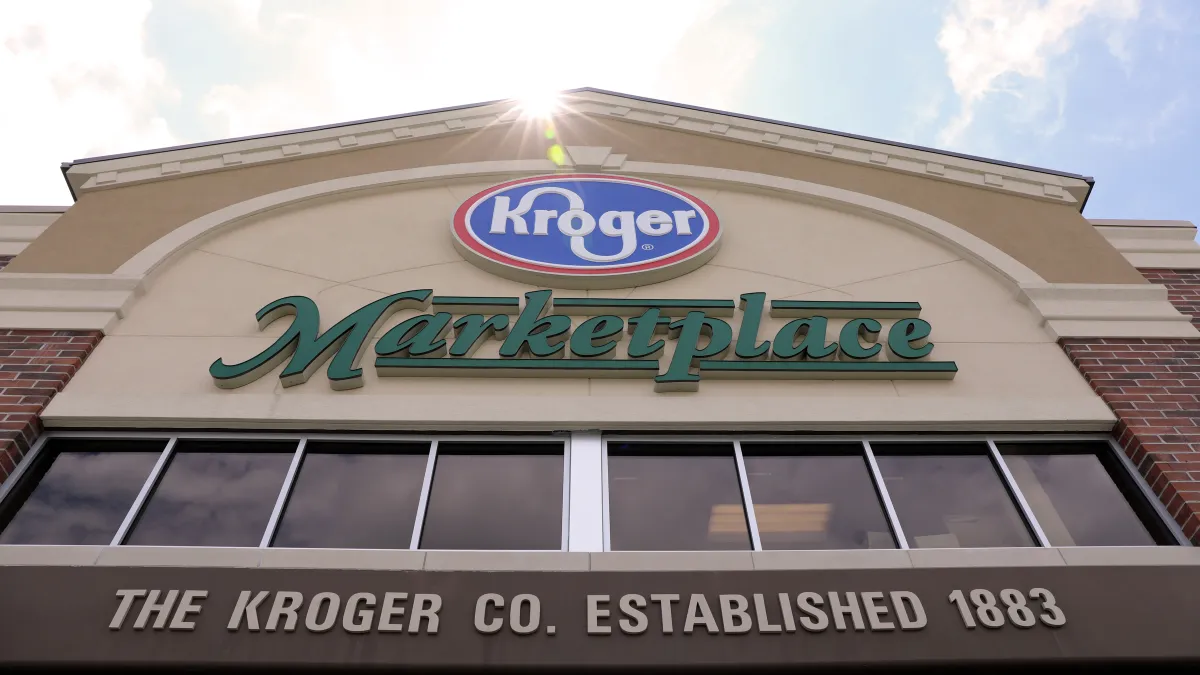Dive Brief:
- Kroger's data and analytics unit 84.51° unveiled a collaborative cloud for marketers that draws on the grocer's anonymized transaction-level data from 60 million U.S. households, according to a news release. Conagra Brands, the owner of Reddi-wip, Slim Jim and Vlasic, has been using the service for around a year and a half, a Kroger spokesperson said, and has been able to attract and retain new customers in "disproportionately high numbers."
- The 84.51° Collaborative Cloud, built with tech partners Microsoft Azure, Databricks and Snowflake, aims to be privacy-compliant while providing a more granular view of customer behavior so companies can make informed decisions around everything from marketing spending to production levels. Clients can pick the Kroger transaction data they think is most applicable to their business, and 84.51° will build individualized environments based on those needs.
- From there, 84.51° provides guidance on managing projects, pairing its own experts with client-side data scientists. The initiative, one of Kroger's growing number of bets on retail media, seeks to help CPGs keep pace with ongoing supply chain and pandemic-related disruptions.
Dive Insight:
Kroger, the largest grocery chain in the U.S., continues to lean into its scale and troves of first-party data as it tries to build a robust retail media business. Retail media has become a hotter item since Google announced plans to deprecate third-party cookies last year, with companies like Walmart, CVS, Target and Lowe's racing to develop their own networks and tech products.
CPGs typically don’t own the point of sale, which has pushed them to spend more with retailers that can provide a closer view of where and how customers are shopping. Keeping track of those habits has grown more pressing as the pandemic accelerates the adoption of channels like delivery and continues to throw the supply chain out of whack — an issue that has started to have acute impacts on marketing plans around the fourth quarter and accompanying holiday window.
The 84.51° Collaborative Cloud wields an arsenal of 2 billion annual transactions drawn from nearly 60 million households, a figure Kroger estimates represents about half of the country. Those data points are unaggregated and encrypted with an anonymized, persistent household ID — an attempt to balance privacy considerations with accuracy — along with being updated weekly. They encompass in-store, delivery and online orders.
Using that information, the 84.51° Collaborative Cloud can construct environments for clients to use on an individualized basis as they try to gauge demand and be more efficient with their production, shopper retention and marketing dollars. Cloud-based services and data "clean rooms" — essentially digital clearinghouses for sensitive consumer information — are becoming more common as online marketplaces and traditional retailers try to court more brand dollars. Amazon, for instance, rolled out its long-anticipated Amazon Marketing Cloud, a bet on the viability of clean rooms, last month.
At a time when marketers are seeking greater control over their business, part of Kroger's pitch is what it calls a "flexible engagement model." Conceptually, that means providing support to existing client-side data scientist and tech teams as they develop their own projects, rather than Kroger handling all of those operations itself.
"84.51° Collaborative Cloud has become a go-to resource for my team's most complex analyses," Brian Archey, senior director, data science and analytics for Conagra Brands, said in a press statement. "It covers the bases for our modern, data-driven approach for innovation, offering speed, compatibility with our tech stack and a robust national footprint of household purchase behavior."
The news adds to Kroger's bigger tech ambitions for 84.51°, a unit formed as part of its acquisition of Dunnhumby's assets in 2015. Kroger Precision Marketing at 84.51°, which is focused on retail media, debuted two years later.
In October, the grocer announced the launch of a private programmatic marketplace that similarly centers on its vast stores of transaction-level first-party data. The Kroger Private Marketplace also tries to allow clients to have their pick of ad-tech providers rather than pushing them to work with a particular set of vendors.















